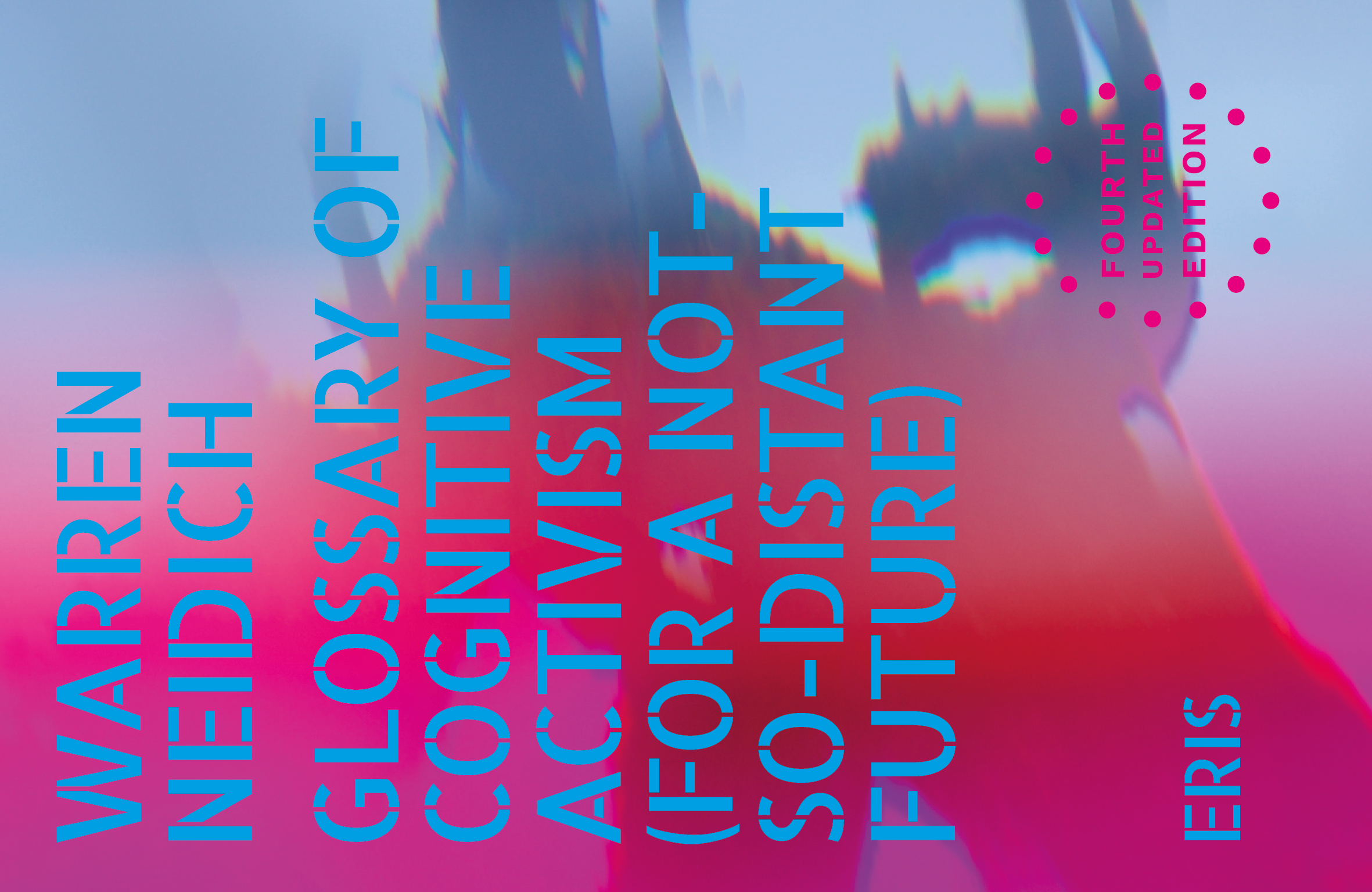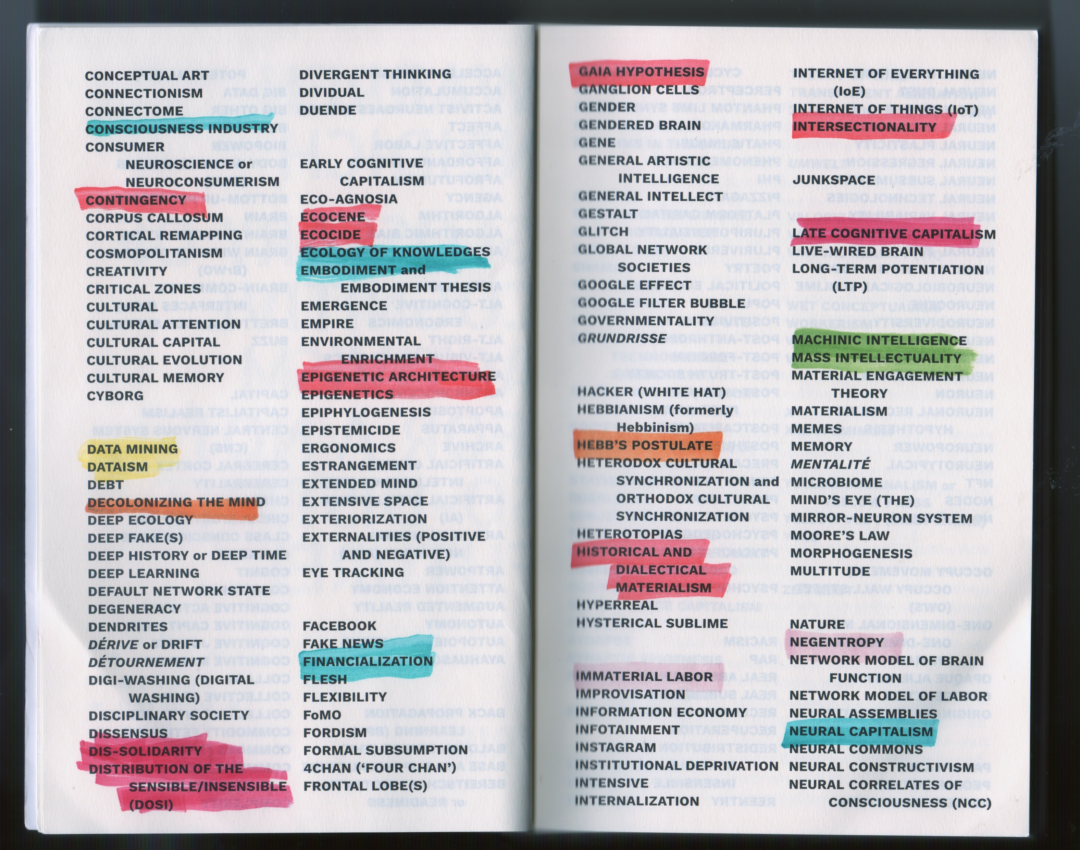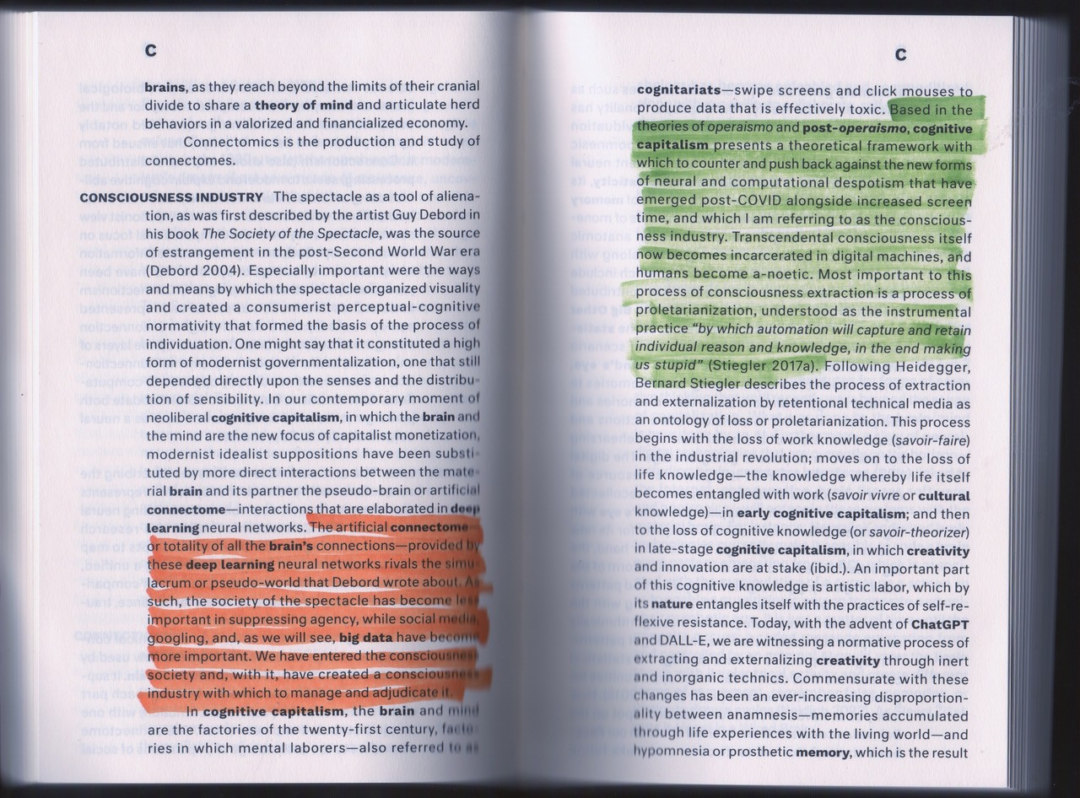Warren Neidich, Glossary of Cognitive Activism, 4e édition, Eris Books, 2024

Warren Neidich’s Glossary of Cognitive Activism, the 4th edition of which we are discussing here, has been thoroughly revised and expanded, and takes a relatively new form – that of a glossary – in response to the conceptual and terminological challenge posed by its subject. Indeed, “cognitive activism” is supposed to respond to the context and challenge posed by the era of “cognitive capitalism” and the “cognitariat”. Thus we can already see that the field in which the work intervenes, indeed that it creates, is hybrid and interdisciplinary. It brings together aesthetic practice (including in its militant, and therefore “activist” dimension), concepts drawn from the neuro-cognitive sciences, and avant-garde thinking on the perils and promises of future and already actualized technologies; in short, what Foucault would have called a “history of the present”. We should also mention Deleuze’s fascinating and mysterious assertion that to create new circuits in art is to create circuits in the brain: an assertion of art-brain identity, of which the Neidich project would be one of the only genuine examples.
Neidich highlights a paradigm shift that occurred with the arrival of new neural based computational technologies: we have moved from the paradigm of capitalism’s exploitation of the body to a new form of exploitation, that of the brain; “from the assembly line to the position in front of a computer screen”… The performance and exploitation of the immaterial labor of individuals, the cognitariat, has replaced the physical exploitation of workers – what Neidich calls “early cognitive capitalism”. But this evolution is not complete, nor is it over. According to him cognitive capitalism is now in its late-stage.
The challenge, then, is to develop a new form of resistance to this exploitation of human brains, resulting from neuro-capitalism /cognitive capitalism. As Neidich points out, it’s a matter of articulating new forms of resistance, as was already the case in the face of the shift towards an information society and economy. The aim of the glossary is thus to raise awareness of the danger of this neural shift in the capitalist process and exploitation of human beings. Without being too grandiose, it is reminiscent of Diderot and D’Alembert’s Encyclopédie (admittedly an enormous collective work, whereas this glossary is the work of one author), since in both cases there is the desire to produce a dictionary enabling readers to orient themselves in both cultural and technological spheres, and to demystify a number of concepts. In Neidich’s vocabulary, this means “destabilizing the complex means by which a present and evolving future neuronal capitalism will work to create contemporary forms of neural governance and subsumption”.
This approach, and the search for a form of resistance to this exploitation are part of a philosophical tradition that is quite close to French Theory (Foucault, Debord, Deleuze and Guattari, Stiegler, etc.), as well as to the theoretical movement of accelerationism (note that this is the first definition that appears in the glossary, which helps set the tone of the book) and new cognitive theories.
Neidich thus proposes a new idea, which he calls the “brain without organs”. This expression is reminiscent of the “body without organs”, first used by Antonin Artaud and developed by Gilles Deleuze and Félix Guattari in A Thousand Plateaus (1980). The theory of the brain without organs depends on two important epistemological frameworks. Firstly, the environmentally induced development of neuronal networks through their stabilization, as analyzed by Jean-Pierre Changeux, and secondly, Bernard Stiegler’s concept of exosomatic organogenesis, which emphasizes the role played by the evolution of technology in the development of the brain. The organ-free biological brain is freed from the organizational capacities of the endosomatic genetic code subsumed by the despotic, exosomatic and capitalist techno-socio-political milieu, which secondarily sculpts the brain’s neuronal plasticity and normalizes its variations, creating a population of easily governed neurotypical citizens.

Excerpt from the book Warren Neidich, Glossary of cognitive activism (for a not-so-distant future), 4ème édition, Eris Books, 2024.
The glossary is then part of the author’s overall approach to developing a phylim of new technologies in order to reappropriate them and respond appropriately to neurocapitalist exploitation. If the primary aim of cognitive capitalism is to exploit “material brains”, then a form of resistance is needed, which Neidich calls “cognitive activism”.
Cognitive activism is a call to create a new vocabulary, a new linguistic and conceptual toolbox to describe the conditions of cognitive capitalism, but also to elaborate (closer to practice) circuits (in the Deleuzian sense) of performativity and action, in order to combat the psychic distress induced by this state of existence. Ideas from the neurosciences will be incorporated, but in a form that Neidich describes (another Deleuzian term, in this case more Deleuzo-Guattarian) as “deterritorialized”. Here are just a few of the strategies Neidich lists as belonging to this cognitive-activist project: hacking, whistle-blowing, cryptography, use of the dark web, artistic and poetic acts tending to blur the sensible/insensible divide, yoga and meditation practices, as well as the use of ayahuasca and other psychedelic substances. But also, a notion of cognitive justice, which includes the right to coexist of different knowledge traditions and the cultural practices in which they are engaged, without constraint, including the epistemologies of the European subcontinent, the Global South, including indigeneous and ancestral knowledge. Neidich writes that “This link with cognitive justice implies a greater degree of complexity, both in the cultural milieu and in the brain” (see Deleuze’s statement quoted above).
Indeed, if this paradigm shift from corporeality to immateriality implies new dangers of exploitation, it also implies, for Neidich, new forms of resistance. Just as the technology of cinema was for Benjamin both a potential for resistance and a potential for fascist oppression, new forms of neuropower (a more neuro-centric version of the concept of biopower), including their link to new media technologies, and to the commodification of our neural capacities, “provide new potentials, both for oppression and for emancipation”.
According to Stiegler’s theory, the brain evolves and modifies itself according to the external environment (which implies a radical modification of the brain with the arrival, exposure and use of new computational technologies).The activist dimension that Neidich envisages here would add that one of the ways to emancipate oneself and counter the control of cognitive capitalism would be to change one’s environment: the visual environment, the affective environment, the psychic environment and the ecological environment; what the late, great Félix Guattari, who would no doubt have recognized himself in the project presented here, would have called the “production of subjectivities”.

https://cup.columbia.edu/book/glossary-of-cognitive-activism/9781912475360
https://eris.press/Warren-Neidich
Emma Fitzgibbon is a student in aesthetic philosophy at the Université Paris 1 Panthéon-Sorbonne. Her research focuses mainly on experimental electronic music, cybernetics, theory-fiction and the implication of new media in contemporary art.
Charles Wolfe is professor of modern and contemporary philosophy at the Université de Toulouse Jean Jaurès, and the author of various works, notably on vitalism and materialism. His most recent publication is The History and Philosophy of Materialism (co-edited with John Symons).
Head image : Book cover Warren Neidich, Glossary of cognitive activism (for a not-so-distant future), 4th edition, Eris Books, 2024.
Related articles
Ralph Lemon
by Caroline Ferreira
Ho Tzu Nyen
by Gabriela Anco
Hilma af Klint
by Patrice Joly

